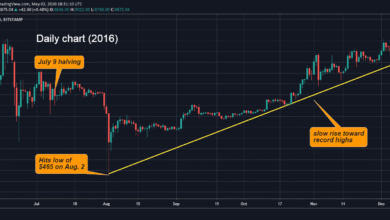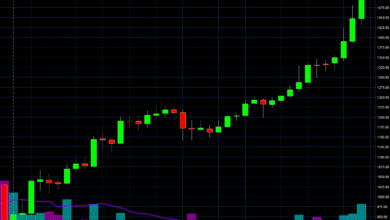China Cryptocurrencies Demand Fuels Stock Market Surge

China’s cryptocurrency landscape is experiencing a newfound demand that is reshaping the market dynamics, particularly in the regional context of cryptocurrencies in Hong Kong. Following years of stringent restrictions on digital assets, the surge in interest has resulted in a remarkable uptick in stocks like Guotai Junan, which recently became the first brokerage from mainland China to facilitate crypto trading under new regulations. This shift aligns with Hong Kong’s recent adoption of a stablecoin framework, reflecting the potential for digital currencies to play a pivotal role in future financial ecosystems. Analysts from Morgan Stanley noted that the People’s Bank of China (PBOC) is strategically utilizing Hong Kong as a testing ground for these innovations, as evident in their stablecoin strategy amidst a backdrop of evolving crypto laws. As demand for alternative digital currencies rises, the implications for investments, including those linked to stocks like China Renaissance cryptocurrency, could be substantial.
The recent surge in interest regarding digital currencies from China marks a significant shift within the region’s financial landscape. The underlying demand for crypto assets, particularly stablecoins in Hong Kong, suggests a growing recognition of their utility beyond mere speculation. This emerging trend is being reflected in various market movements, such as the impressive stock performance of Guotai Junan International and other firms pivoting to embrace the opportunities presented by crypto trading regulations. Furthermore, companies like China Renaissance are actively partaking in the investment and expansion into the realm of cryptocurrency, signaling a broader acceptance and integration of digital assets in China’s economic fabric. This transition not only highlights the financial sector’s adaptability but also poses intriguing questions about the future of regulation and innovation in the cryptocurrency space.
The Rise of Guotai Junan: Pioneering Crypto Trading in Hong Kong
Guotai Junan International’s stock has seen unprecedented growth, rising nearly threefold after it became the first mainland-backed securities firm to receive a crypto trading license in Hong Kong. This regulatory shift highlights the burgeoning interest and demand for cryptocurrencies from mainland investors, who are now actively seeking out opportunities in the Hong Kong market. The company’s surge to first place in trading value, surpassing major players like Alibaba, signifies a pivotal moment as Beijing’s previous restrictions seem to soften, allowing local firms to explore cryptocurrency investments more freely.
Additionally, Guotai’s momentum is indicative of a larger trend within China’s financial landscape. The acknowledgment of stablecoins and the regulatory framework supporting virtual asset management in Hong Kong has rejuvenated investor zest. This shift in investor sentiment reflects a significant departure from the past, alongside an appetite for diversified portfolios that include cryptocurrencies. It begs the question: could this be a precursor to wider acceptance of crypto trading across other sectors in China?
China’s Cryptocurrencies Demand: A Market Reawakening
The demand for cryptocurrencies in China is undeniably re-emerging, particularly in the context of Hong Kong’s progressive stance on virtual assets. With stablecoins now at the forefront of discussions among Chinese regulators and financial institutions, there appears to be a strategic pivot aimed at integrating digital currencies into the financial framework. The People’s Bank of China (PBOC) is exploring ways to leverage stablecoins as part of its broader financial strategy, thus opening the door for greater adoption among Chinese consumers and businesses alike.
This increasing demand is further fueled by global trends and concerns, particularly around the dominance of the U.S. dollar and its implications for China’s economic sovereignty. As traditional funds flow into crypto assets, savvy investors are recognizing the importance of aligning with emerging digital currency trends, which could offer protection against potential currency devaluation. The potential introduction of stablecoins could disrupt existing financial models, emphasizing the need for China to actively participate in the evolving cryptocurrency landscape.
Hong Kong as a Crypto Hub: Embracing Stablecoins
Hong Kong’s recent legislative measures surrounding stablecoins have positioned it as a leading crypto hub in Asia. The adoption of a stablecoin bill signals that authorities are ready to embrace virtual assets, enabling local companies to explore innovative financial products. This regulatory clarity not only drives local investments but also attracts foreign entities seeking to participate in Hong Kong’s evolving financial ecosystem. As companies like China Renaissance venture into cryptocurrency investments, it exemplifies the buoyant environment fostering growth within the region.
Moreover, the strategic importance of stablecoins in facilitating international trade cannot be overlooked. By allowing businesses to leverage stablecoins, Hong Kong can enhance its attractiveness as a gateway for global transactions. Firms operating within the stablecoin arena stand to gain significant advantages, particularly in cross-border commerce, where traditional banking mechanisms often pose limitations. As such, the region’s focus on stablecoins will undoubtedly shape its financial future, spurring further growth in crypto-related industries.
China Renaissance: Investing in the Future of Cryptocurrency
As one of the notable players in the Hong Kong cryptocurrency landscape, China Renaissance announced its commitment to invest $100 million over the next two years in the assets associated with this digital sector. This investment plan demonstrates the company’s forward-thinking strategy amidst evolving market conditions and regulatory frameworks. By expanding its operations into the Web 3.0 space, China Renaissance is positioning itself as a trailblazer in integrating advanced digital technologies and financial solutions.
The hiring of Frank Fu, a former CEO from a major crypto exchange, further cements this commitment to innovation. Such leadership is crucial in navigating the complexities of crypto regulations while tapping into the burgeoning demand for cryptocurrencies. This strategic hiring, combined with solid investment plans, positions China Renaissance to take advantage of shifting market dynamics and the increasing acceptance of digital currencies in the broader financial landscape.
Shifts in Crypto Trading Regulations: Opportunities for Growth
The recent relaxation of crypto trading regulations in Hong Kong represents a significant opportunity for growth within the cryptocurrency market. The ability for firms like TF Securities to obtain licenses for virtual asset trading opens the floodgates for innovation and competition in the sector. Regulatory bodies recognizing the importance of stablecoins indicates a critical shift towards a more inclusive and expansive approach to digital assets, thus providing investors with more options tailored to their preferences.
Moreover, this regulatory evolution also garners interest from institutional investors who may have previously shunned cryptocurrencies due to apprehensions about compliance and market stability. Elevated transparency and improved regulatory frameworks instill confidence, making it easier for these investors to allocate capital toward crypto assets. As stock markets respond positively to these developments, it becomes increasingly likely that more companies will venture into the cryptocurrency domain, awaiting the next wave of digital finance disruption.
The Future of Stablecoins in China’s Digital Economy
As the discourse around stablecoins becomes more pronounced, China’s digital economy stands to gain significantly from their potential integration. With regulatory frameworks in place, financial institutions can more confidently issue stablecoins, fostering an environment ripe for innovation. Stablecoins have the ability to bridge traditional financial systems with emerging digital currencies, making them an essential component of China’s future economic landscape. As the digital yuan continues to evolve, stablecoins could play a pivotal role in increasing efficiency in transaction processes.
Furthermore, international trade can benefit immensely from the adoption of stablecoins. E-commerce companies, such as JD.com, are key players in this space as they explore digital options for settling transactions. By utilizing stablecoins in cross-border trades, these companies can bypass traditional banking delays and currency fluctuations, streamlining operations. Thus, the traction stablecoins gain in both local and international markets could establish China as a leader in the next phase of digital finance.
Market Sentiment: Influences on Cryptocurrency Investments
Recent market sentiments indicate an overwhelming positivity surrounding the cryptocurrency sector, particularly for companies actively involved in virtual assets. Analysts note that investors are not just responding to new products but are chasing emerging themes in the market. As demonstrated by the trading actions of Guotai Junan and TF Securities, investor interest is increasingly swaying stock prices, reflecting a growing belief in the potential of cryptocurrencies, especially stablecoins.
However, it’s essential to treat this sentiment with caution. While the short-term surge in stock prices may indicate enthusiasm, it often stems from speculative behavior rather than fundamentals. As more firms gain approvals for virtual asset trading, the market may see numerous fluctuations as investors navigate through this rapidly changing landscape. Hence, future moves will require a careful assessment of both emerging opportunities and inherent risks in the cryptocurrency market.
Crypto Events in Hong Kong: The Rising Awareness of Digital Assets
The expansion of global cryptocurrency events, such as Consenus, into Hong Kong signifies an increasing awareness and acceptance of digital assets within the region. These events bring together industry leaders, innovators, and investors, creating a conducive environment for knowledge sharing and networking. By hosting these high-profile gatherings, Hong Kong positions itself as a central hub for cryptocurrency discussions, thus boosting regional interest and investment.
Additionally, the local government’s recognition of the potential benefits of the cryptocurrency sector fosters a growing community of entrepreneurs and developers focused on blockchain technology and its applications. As these events continue to draw attention, they will likely play a crucial role in driving the adoption of stablecoins and other digital assets within the financial ecosystem. Ultimately, this momentum could lead to tangible advancements in how the finance sector operates in China and beyond.
PBOC’s Strategy: Navigating Stablecoins and Digital Currency
The People’s Bank of China (PBOC) is on the frontline of developing strategies to incorporate stablecoins into the national financial framework. As they explore potential applications within digital currencies, the PBOC aims to mitigate risks associated with financial speculation while leveraging the benefits stablecoins can offer. Their approach is indicative of a broader intent to maintain economic stability and prevent capital outflows, especially amidst global competition for digital currency dominance.
Moreover, by positioning itself as a leader in the realm of stablecoins, the PBOC can create synergies between domestic economy sectors and the global cryptocurrency market. Continued advocacy for the regulated use of these digital assets will paramount to cultivating an infrastructure that fosters innovation while prioritizing consumer protection and financial integrity. Such an approach not only reinforces confidence in the overall financial system but also elevates China’s status within the global digital finance arena.
Frequently Asked Questions
How is China’s suppressed demand for cryptocurrencies influencing stocks like Guotai Junan?
China’s suppressed demand for cryptocurrencies is significantly influencing stocks like Guotai Junan, especially after the company became the first mainland-backed brokerage to secure a virtual currency trading license in Hong Kong. This move has led to a surge in trading volumes and stock prices, demonstrating the pent-up interest from mainland investors.
What role do stablecoins play in China’s cryptocurrency market?
Stablecoins are becoming increasingly important in China’s cryptocurrency market as regulators in Hong Kong consider allowing their use. The adoption of stablecoin legislation in Hong Kong aims to facilitate the management of virtual assets, reflecting China’s cautious yet growing interest in cryptocurrencies.
What are the recent developments in crypto trading regulations in China?
Recent developments in China’s crypto trading regulations include a shift in focus towards stablecoins and virtual asset trading in Hong Kong. Following the PBOC’s hints at a potential pivot, more companies are starting to invest in cryptocurrencies, indicating a possible relaxation in the previously strict regulations.
How is the People’s Bank of China’s (PBOC) stablecoin strategy being observed in Hong Kong?
The PBOC’s stablecoin strategy is being tested in Hong Kong, where authorities have implemented laws to regulate stablecoin issuance and trading. This allows Chinese firms to explore digital alternatives, showing a clear interest from the PBOC in utilizing Hong Kong as a testing ground for future digital payment solutions.
What impacts do companies like China Renaissance have on the demand for cryptocurrencies in China?
Companies like China Renaissance are impacting the demand for cryptocurrencies in China by announcing significant investments in the crypto sector. Their commitment to allocate $100 million towards cryptocurrency assets is a clear indication of the growing interest and potential market expansion for digital currencies within China.
Why is there rising interest in stablecoins among Chinese investors?
Rising interest in stablecoins among Chinese investors is driven by concerns over U.S. dollar dominance and regulatory developments in Hong Kong that make stablecoin investments more accessible. This creates new avenues for investment in a market that has historically seen strict limitations on cryptocurrency trading.
What could the future hold for cryptocurrencies in China given the current trends?
The future of cryptocurrencies in China appears cautiously optimistic, with signs of increasing interest in stablecoins and an emerging regulatory framework in Hong Kong. As firms continue to invest and expand their crypto activities, the landscape may evolve towards a more integrated digital asset market.
How has the market reacted to Guotai Junan’s entry into the cryptocurrency trading space?
The market has reacted positively to Guotai Junan’s entry into cryptocurrency trading, evidenced by a dramatic increase in its stock price and trading volume. This excitement suggests a strong belief among investors in the potential growth of stablecoins and digital asset trading within the region.
What opportunities might stablecoins create for international online sales of Chinese goods?
Stablecoins may provide significant opportunities for international online sales of Chinese goods by enabling smoother cross-border transactions, lowering transaction fees, and enhancing payment security, thereby increasing competitiveness in the global market.
How does the development of virtual asset trading firms in Hong Kong affect the cryptocurrency landscape in China?
The development of virtual asset trading firms in Hong Kong represents a crucial shift in the cryptocurrency landscape, indicating a possible loosening of restrictions on the mainland and paving the way for broader acceptance and integration of cryptocurrencies within the Chinese financial system.
| Key Point | Details |
|---|---|
| China’s Crypto Ban | China officially banned cryptocurrencies in 2021, impacting domestic markets. |
| Hong Kong’s Market Response | Guotai Junan International’s shares tripled after gaining a crypto trading license, indicating a surge in local demand. |
| Regulatory Changes | Hong Kong’s stablecoin bill allows formal management of virtual assets, enabling a more favorable trading environment. |
| Investment in Cryptocurrencies | China Renaissance plans to invest $100 million in crypto assets, signaling growing interest in the sector. |
| Market Dynamics | Analysts believe recent stock price surges are driven more by speculative behavior than actual business growth. |
| Digital Infrastructure Race | Forgetfulness of crypto trends risks China falling behind in global digital currency advancements. |
Summary
China cryptocurrencies demand is on the rise as suppressed interest begins to surface in Hong Kong’s markets, following years of regulatory bans. Recent developments in stablecoin legislation and local brokerage licenses indicate a shift in the environment surrounding digital assets, allowing Chinese investors to engage more actively with cryptocurrencies. As firms like Guotai Junan International and China Renaissance capitalize on this upward trend, the market anticipates further growth in Hong Kong’s crypto landscape, reinforcing the necessity for China to embrace digital innovations or risk lagging in the global race for digital infrastructure.




